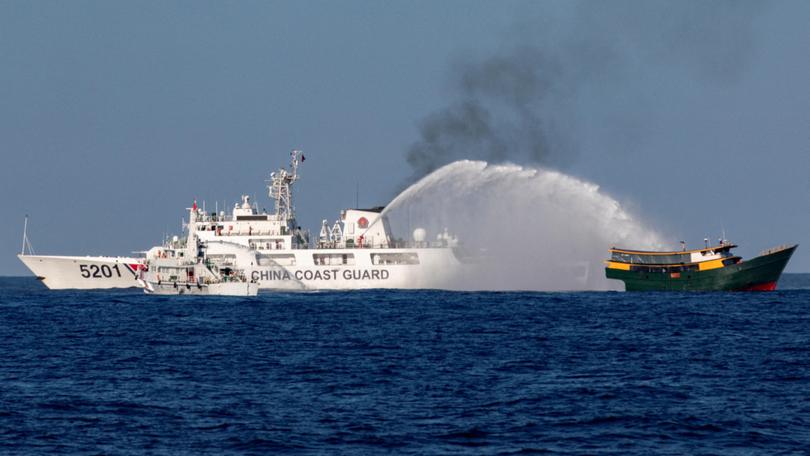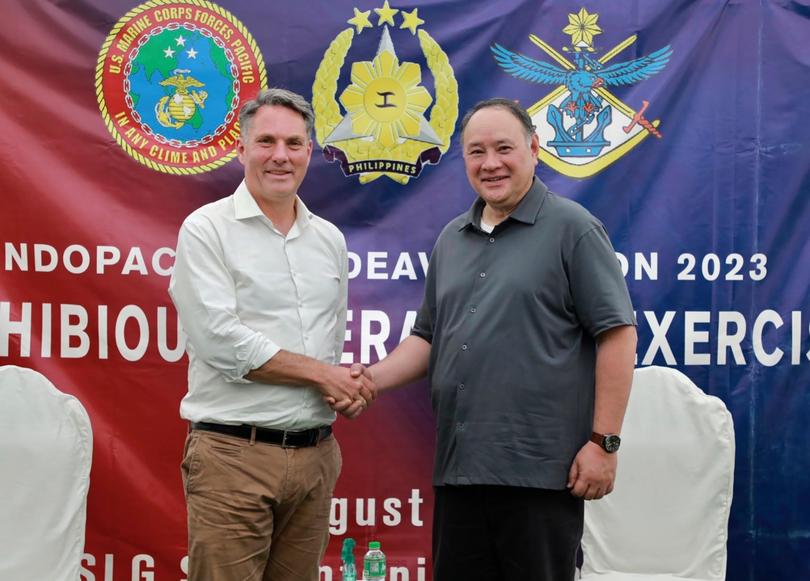Australian and Philippines defence chiefs bolster military ties in bid to counter Chinese aggression

Australia and the Philippines have agreed to step up the tempo of their military cooperation to counter China’s increasingly aggressive actions in the South China Sea.
Defence Minister Richard Marles praised the “transformatively new level” of relations with Manila after meeting with Philippine Secretary of National Defence, Gilberto Teodoro Jr, for the first time on Australian soil on Tuesday.
The defence chiefs announced plans to update a 1995 cooperation deal to boost their strategic alignment and to send an Australian engineering team to support the Philippines’ growing defence infrastructure.
Sign up to The Nightly's newsletters.
Get the first look at the digital newspaper, curated daily stories and breaking headlines delivered to your inbox.
By continuing you agree to our Terms and Privacy Policy.As a sign of Manila’s growing strategic importance, the Philippines will take part next year for the first time in Talisman Sabre, the biennial military exercise led by Australia and the United States.
“We are looking at ways in which our defence industries can work more closely together and at ways in which Australia can support the Philippines in the building of its capability,” said Mr Marles.
“Building the most interoperable defence forces between Australia and the Philippines is very much in the national interests of Australia, it’s in the interests of the Philippines and it speaks to a partnership that is going from strength to strength.”
Mr Teodoro thanked Australia for its support in helping Manila to steel up its capabilities to build a credible defence force.
“What we see is an increasing demand by Beijing for us to concede our sovereign rights in the area,” he said. “We are direct victims of Chinese aggression.”

The moves to bolster bilateral defence ties will likely be criticised by China, which has grown increasingly suspicious of an expanding alliance of democratic nations in the region as it expands its own military footprint.
Canberra and Manila have been stepping up bilateral defence ties in recent years through joint drills and military cooperation against a backdrop of escalating tensions over disputed areas of the strategically important South China Sea.
Australia is a lynchpin of a widening network of democratic partners coordinating efforts to counter China’s assertiveness in the Indo-Pacific, and it recently joined a regional group of the Philippines, Japan and the US, nicknamed the “Squad.”
The “Squad” defence chiefs first met in June 2023 in Singapore and the group has since conducted joint maritime patrols within the Philippines’ exclusive economic zone (EEZ).
The source of the tensions lies with Beijing claims of sovereignty and historical rights over nearly all of the resource-rich sea, including areas claimed by the Philippines, Brunei, Indonesia, Vietnam and Malaysia.
China’s expanding influence has raised international alarm over its ambitions to control the strategic waterway, which not only contains plentiful deposits of fossil fuels but today facilitates about $3.4 trillion in annual ship-borne trade.
An international tribunal in The Hague dismissed China’s maritime claims in 2016 as having no legal basis, but China rejected this ruling and has continued to militarise islands and atolls while denying access to disputed waters to rival Southeast Asian claimants.
Backed by a formidable armada of coastguard ships, Beijing routinely accuses vessels of trespassing into waters it claims as its own, but which lie within the 200-mile EEZ of other countries.
This has led to fierce diplomatic clashes between Manila and Beijing over the past year, as well as to a series of dangerous confrontations at sea between Philippine and Chinese coastguard vessels.
Chinese vessels have accelerated so-called grey-zone activities, including shadowing, bumping, harassing, and swarming Philippine supply and patrol ships, as well as using high-powered water cannons to block their passage.
The ferocity of the skirmishes has stoked fears of wider regional escalation, creating a crisis that could tip into conflict — even accidentally — in the next few years.
Philippine President Ferdinand Marcos has taken a firm stand against China’s territorial claims and has boosted Manila’s security relationship with Washington, which is bound to respond to any military attack on the Philippines by a mutual defence treaty.
Earlier this year, Mr Marcos warned that if a Filipino citizen was killed “by a wilful act” during a showdown with the Chinese coastguard it would be “very close to what we define as an act of war.”
Since then both countries have attempted to dial down hostilities with an agreement to “jointly manage maritime disputes and reduce tensions” but progress has been limited.
Last weekend, their dispute was reignited after Mr Marcos signed two laws to define the country’s maritime entitlements and set designated sea lanes and air routes to “reinforce sovereignty” — a move that was met by a firm rebuke from the Chinese foreign ministry.
The latest flare-up comes at a time when Australia is seeking to rebalance its ties with China, especially in trade and economic terms, and amid cautions from former senior politicians Paul Keating and Bob Carr for Canberra to carefully calibrate its foreign policy.
“Australian diplomacy should be quietly working, not only with America and with China, but with partners in Asia, Japan and India, towards the notion of a detente between America and China,” Mr Carr told ABC’s Radio National Breakfast on Tuesday.
But Dr Euan Graham, a senior analyst at the Australian Strategic Policy Institute, which hosted a public debate with Mr Teodoro in Melbourne on Monday, said that despite Canberra’s caution while “playing this dance with China” relations with Manila were “very much on the up.”
With the looming unpredictability of US foreign policy under President-elect Donald Trump, “Australia is seen as dependable and not transactional necessarily in the same political way that Trump is likely to be,” he said.
For Australia, too, the Philippines is a vital strategic partner.
“What happens in the South China Sea doesn’t stay in the South China Sea. The precedent of what China is able to accomplish there..the shredding of the UN law of the sea..all of that can play out closer to Australia in the South Pacific or in the Indian Ocean,” he said.
“If you don’t react in the South China Sea, it will probably be too late if you are reacting to the same set of coercion, aggression, and harassment as it plays out closer to home.”

